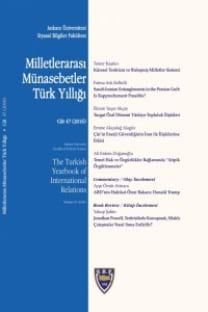Turkish-Syrian Relations in the Time of Faisal 1918-1920
Husain, Sharif of Mecca, on the strength of an agreement with the British, embodied in the so-called MacMahoncorrespondence, revolted against the Gttoman governmenton June lA, 1916, in the middle of the Great war. Readingthe Memoirs of his son, King Abdullah, one is frequentlyreminded by the writer that the quarrel of the Hashimiteswas not with the Gttoman state but with the Committee ofUnion and Progress (CUp).l Specifically, Abdullah's quarrelis, on the one hand, with the CUP's policies of Turkishnationalism which tried to exclude the Arabs and/or toTurkicize them, and, on the other hand, with the policy ofreducing the power of feudalism from the Suıtan down tothe the local Sheikh (in other words, democratization).(One important issue closely related to the latter was modernization: the Hashimites, for instance, were opposed tothe completion of the Hijaz railwayJ How far Abdullahwas sincere in his protestations of loyalty to the Ottomanstate, we cannot know for certain. What is clear is that theCUP was an instrument of Turkish nationalism and that,at least for some time, it did try to follow a policy of Turkincation which aroused reactions not onlyamong Arabs, butalso among other Moslem peoples, most notably the Albanians.
Turkish-Syrian Relations in the Time of Faisal 1918-1920
Husain, Sharif of Mecca, on the strength of an agreement with the British, embodied in the so-called MacMahoncorrespondence, revolted against the Gttoman governmenton June lA, 1916, in the middle of the Great war. Readingthe Memoirs of his son, King Abdullah, one is frequentlyreminded by the writer that the quarrel of the Hashimiteswas not with the Gttoman state but with the Committee ofUnion and Progress (CUp).l Specifically, Abdullah's quarrelis, on the one hand, with the CUP's policies of Turkishnationalism which tried to exclude the Arabs and/or toTurkicize them, and, on the other hand, with the policy ofreducing the power of feudalism from the Suıtan down tothe the local Sheikh (in other words, democratization).(One important issue closely related to the latter was modernization: the Hashimites, for instance, were opposed tothe completion of the Hijaz railwayJ How far Abdullahwas sincere in his protestations of loyalty to the Ottomanstate, we cannot know for certain. What is clear is that theCUP was an instrument of Turkish nationalism and that,at least for some time, it did try to follow a policy of Turkincation which aroused reactions not onlyamong Arabs, butalso among other Moslem peoples, most notably the Albanians.
